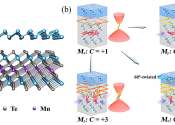Astrophysicists work toward unification of turbulence framework—weak-to-strong transition discovered in turbulence
Turbulence is ubiquitous in nature. It exists everywhere, from our daily lives to the distant universe, while being labeled as "the last great unsolved problem of classical physics" by Richard Feynman. Prof. Dr. Huirong Yan ...



